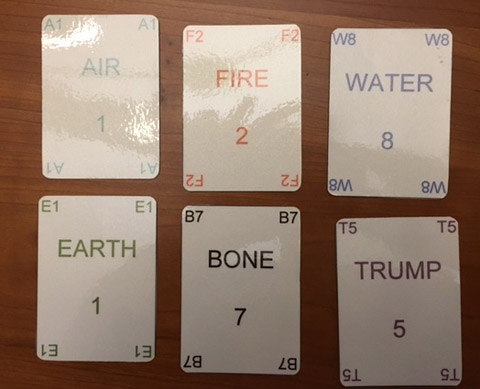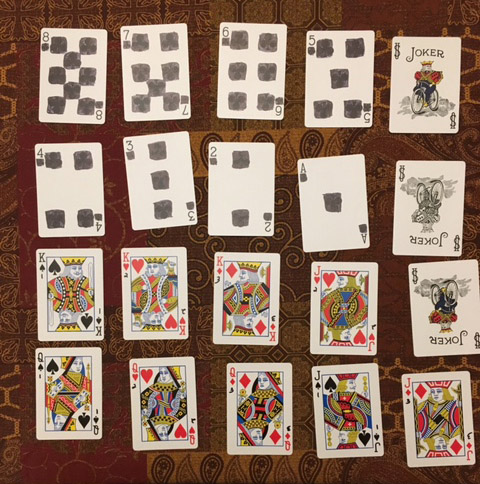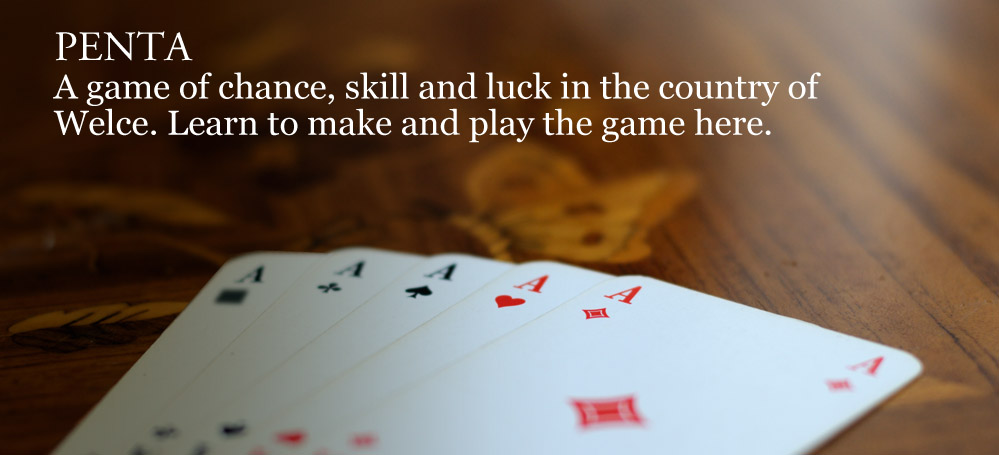Franklin’s Rules of Penta
THE DECK
Penta is played with a 52-card deck. There are five suits, each with eight cards (1 through 8). There are also nine trumps and three wildcards.
THE GAME
Penta is played with cards as a series of hands, each hand being a series of tricks. There is both betting and bidding (prior to playing) on each hand. The winner of each hand takes two-thirds of that hand’s pot; the remainder of the pot is set aside to be awarded at the end of the game. The game lasts until one or more players have reached an agreed-upon goal in bidding points. Players can also elect to skip the betting steps if they choose to play for points, not money.
The sequence of play for each hand is: deal, bet, display, bid, play.
Penta can be played with two to eight players. When four players are involved, the entire deck is used. When there are more or fewer players involved, some of the cards are subtracted, as follows:
2 players—30 cards total—subtract elementals 1-3, trumps 1-5, wild cards 1-2
3 players—42 cards total—subtract elementals 1, trumps 1-4, wild card 1
5 players—50 cards total—subtract 1 trump and 1 wild card
6 players—48 cards total—subtract 3 trumps and 1 wild card
7 players—49 total—subtract 2 trumps and 1 wildcard
8 players—48 total—subtract 3 trumps and 1 wildcard
DEAL
Deal passes to the left with each hand. Once the deck has been adjusted to match the number of players, the entire remaining deck is dealt out. Deal starts to the dealer’s left and proceeds clockwise, one card at a time.
Before each hand is dealt, all players place an ante into the pot.
BETTING
Starting to the left of the dealer, each player bets by adding money to the pot. Each player may fold, match the existing bet, or raise. Prior to the first player to make a bet, players may also pass—not placing any money in the pot, but also not folding. Betting continues until no raises have been made for one circle of the players; the same player may not make two raises without any other intervening raises.
A player who folds places his cards face down and is not involved in the remainder of that hand.
DISPLAY
After the betting is complete, all non-folding players display, face up in front of them, the lowest cards they have in an elemental suit. If they have no cards in a suit, then they do not display a card for that suit. Wild cards may not be used for this.
At this time, the pot is split: two-thirds into the hand pot, which remains in sight, while the other third is added to the reward pot. If the pot cannot be split evenly, the extra chips stay in the hand pot.
BIDDING
Starting to the left of the bidder, each player declares his bid, claiming how many tricks he will take during the current hand. In scoring, each trick of a successful bid counts as ten points, each overtrick is one point; and failing to make a bid counts as ten times the bid. So if a player bids 5 and makes 5, he is awarded 50 points; if he makes 7, he is awarded 52 points; and if he makes four or less, he loses 50 points.
A bid of zero Is legal and succeeding counts as 25 points; failing costs 10 points for each trick taken.
At the end of the game, whoever has the highest point total receives the reward pot; if there’s a tie, the winners split the pot. If the reward pot cannot be split evenly, the extra chips are given while they last to each of the winners, starting to the left of the last dealer.
PLAY
The player to the left of the dealer leads the first trick. Thereafter the winner of the previous trick leads the next one. Players must follow suit—elemental or trumps—if they can. If an elemental suit was led and they are out of that suit, they may discard from another elemental suit, play a wildcard in the led suit, or play a trump. If trumps were led and they are out of trumps, they must discard a non-trump card.
The cards initially displayed in front of each player are part of their hands, and each of them may be played at any legal time. Until they are played, they remain on display.
If no trumps are played, a trick is won by the highest card in the led elemental suit. If trumps are led, the highest trump wins the trick. If one or more trumps are played on a trick for which an elemental card was led, the highest trump wins the trick.
At the end of the hand, the player with the most tricks wins the hand pot. If two or more players tie for the most tricks, the hand pot is split evenly between them, and leftover coins go into the next hand’s pot.
WILD CARDS
A wild card can be played as any elemental card which is not in the current trick. When a wild card is played, the player must announce what other card it is duplicating. A wild card may be led as the first card of a trick, but the player must still declare what card it is duplicating; and all other wild card rules still apply. If a second wild card is played on the same trick, it cannot match the first wild card. If the declared-as card is actually played later in that trick, the wild card must be re-declared to a different card in the same suit, which is not already in that trick. If a player has no cards in the led suit he may, but is not required, to use a wild card to follow suit. Even if a player does have cards in the led suit, he may play a wildcard in that suit.
SHARON’S OBSERVATIONS
Franklin printed and laminated his own cards so he could create the elemental suits. I made a penta deck by buying two decks of identical cards. Then I pulled out the 1-8 of spades and used a black Sharpie to turn each of the spades into a rectangle. That makes it difficult to distinguish from the clubs and spades, so perhaps a blue Sharpie would have been better! Here are a couple of photos to make it easier to visualize.
I then assigned elemental affiliations to my resulting suits:
Hearts—sweela (of course)
Spades—torz (because you use a spade to dig in the dirt)
Clubs—hunti (because you make a club out of wood)
Diamonds—elay (because they glitter in the air)
Rectangles—coru (because they look like reflecting pools, particularly if you use a blue Sharpie)
Then I pulled three kings, three queens and three jacks to represent the trumps. I used spades, hearts, and diamonds and numbered them 1,2,3 (king of spades is therefore the highest trump). I used three jokers from the combined decks as my wildcards.
I played by Franklin’s rules and also experimented with playing a simplified version very like the card game spades. Basically, I adjusted for the number of players then dealt all cards. The player to the left of the dealer led the first trick and I didn’t bother with displaying cards or betting. Scoring and wildcards followed his rules.
What I found was that it’s very easy to go set because having so many suits means nobody has more than a few cards in any one of them. It’s common for an ace to be trumped; but every once in a while, an eight will take a trick. Wildcards aren’t that valuable more of the time…then suddenly they’ll come in really handy.
I have not tried playing partners, but I think this would make it a lot more interesting and would certainly make it easier to successfully make a zero bid.
I enjoyed playing the game and hope you do too!
Franlin's Penta Deck

My Penta Deck

|
